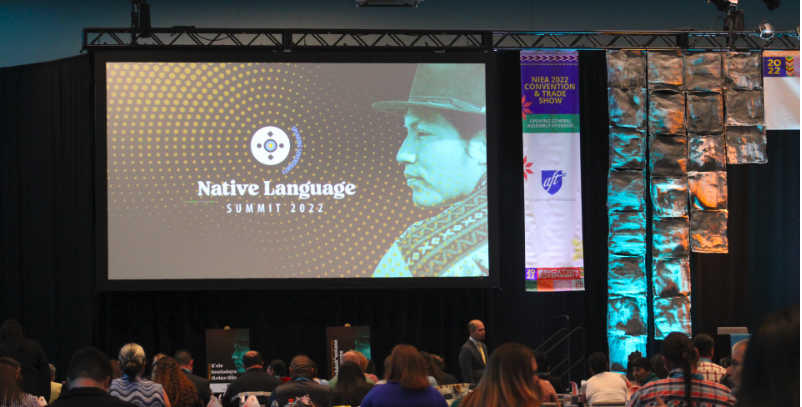Revitalization
Through 21st-century legislation and activism, the revitalization of the Lakota language is now in full swing. Emerging from the destructive legacy of the boarding school era and policies aimed at assimilation, efforts to revive Lakotiyapi have not only halted the language’s decline but have initiated its growth. Thanks to the ingenuity of dedicated Lakota educators and activists, a variety of innovative methods have been developed to teach and promote understanding of Lakotiyapi

Orthography
Albert White Hat Sr. (1938 – 2013) created the first orthography by a native Lakota speaker. He wrote a book Reading and Writing the Lakota Language that ties together Lakota culture, religion, and Language. He used the book in his courses at Sinte Gleska University on the Rosebud Indian Reservation where he was the head of the Lakota Studies Department. Vine Deloria Jr. wrote in the foreword of White Hat’s book: “Albert White Hat reverses the traditional method of explaining language by showing through examples, anecdotes and lessons the world view and values of the Brule Lakota, how people speak and think,” 1


In showing how the language is connected to culture and cognition, White Hat demonstrated the importance and power of learning the language. His orthography serves as a powerful tool in Lakotiyapi revitalization as it made it easy for schools to teach the language with a strong and consistent orthography. Today, it is the official orthography of the Rosebud Reservation.2
There are, however, other orthographies such as Karen White Butterflies “Lakota sounds” and the Lakota Language Consortium’s (LLC) orthography.3 The latter, is very accessible and provides a free dictionary app for apple and android platforms. The dictionary recognizes English and any orthography and provides a definition and a male and female voice audio.4
Immersion Schools
Language immersion schools are the best way to very quickly learn. A post from October 2023 from Native News Online covers the Wakanyeja Tokeyahci Wounspe Ti (Children First Learning Center) which is the Lakota language immersion school on the Rosebud Reservation. Through this school, new teachers and Lakota speakers gain confidence using their language while teaching a new generation the Lakota language and simultaneously immersing them in culture and traditions. (Berg, Kaili. 5

With the rising popularity of immersion schools, many Native American languages now have their own dedicated institutions. These schools play a crucial role in undoing the damage inflicted by boarding schools, replacing English-centric education with Lakota language instruction and cultural immersion. Students receive Lakota names and engage with Lakota culture, laying the foundation for a future generation of Lakotiyapi speakers.
As language diminishes, so does the understanding of culture, religion, and everyday way of living, but the opposite is also true. A more profound understanding of the religious practices is gained when the language is deeply known. Even though many ceremonies are done today in English, in order for the culture, religion, and traditions to thrive, it is vital for Lakotiyapi to become widely spoken amongst Lakota people.
Other Resources
– Teacher training programs
-Classroom materials
– Dictionary
-Grammar Handbook
–Owóksape e-learning portal
-Lakota keyboard
-Vocab builder app
-Lakota media player app
– Children books
– Children songs

Heart of All Oral History Project:
From the website:
“Hau otakuye. Hello relatives. We welcome you to the HEART OF ALL Oral History Project, a 7 episode audio series that attempts to piece together the long and complicated story of our Lakota oyate, or nation, through the voices of local elders and community members from what is now widely known as the Pine Ridge Indian Reservation. We see this project as an opportunity to finally tell our own story, to set the record straight, and to be reminded by our own relatives where we come from and who we really are. Along the way, we will of course make mention of the rest of the Oceti Sakowin, or Seven Council Fires, as our relatives’ lives are intertwined so closely with our own.”
Artwork by LWS student Hanna Brunsch

Recent News
Cherokee Nation Principal Chief Chuck Hoskin, Jr. (pictured right) writes in a Native News Online Post:
“After the U.S. did so much to try and destroy our language and culture, this bipartisan legislation holds the federal government accountable for undoing that damage. It gives the president greater ability to make sure all federal agencies are meeting requirements and coordinating with each other to support Native languages. The act authorizes a federal survey of Native language use and language revitalization programs’ unmet needs every five years. These surveys will allow tribes, like Cherokee Nation, to advise Congress on ways to improve the delivery of federal resources.”
“President Biden also signed the Native American Language Resource Center Act of 2022. It will help support Native language schools and programs and establish Native language resource centers across the country that can make grants to organizations that perpetuate Native languages. It will support Native language students at all levels of learning, serve as a centralized hub for Native language schools and programs, and enhance distance learning capacity.”6


- Meili, Dianne. “Albert White Hat Sr. Worked to Preserve the Lakota Language.” Windspeaker.Com, 4 Jan. 2019, https://windspeaker.com/news/footprints/albert-white-hat-sr-worked-preserve-lakota-language ↩
- Chrietan, Tom, interview by Elliot H. Conlow, April 9, 2024. ↩
- “Lakota Language Consortium.” Accessed May 6, 2024. https://lakhota.org. ↩
- Chrietan, Tom, interview by Elliot H. Conlow, April 9, 2024. ↩
- Berg, Kaili. “‘We Have to Take Back Our Education’: Lakota Language Immersion School Preserves Language and Culture.” Native News Online, 11 Oct. 2023, https://nativenewsonline.net/education/we-have-to-take-back-our-education-lakota-language-immersion-school-preserves-language-and-culture ↩
- Hoskin Jr., Chuck. “New Federal Laws Will Enhance Advance Language Revitalization.” Native News Online. Accessed Accessed May 6, 2024. URL: https://nativenewsonline.net/opinion/new-federal-laws-will-enhance-advance-language-revitalization. ↩